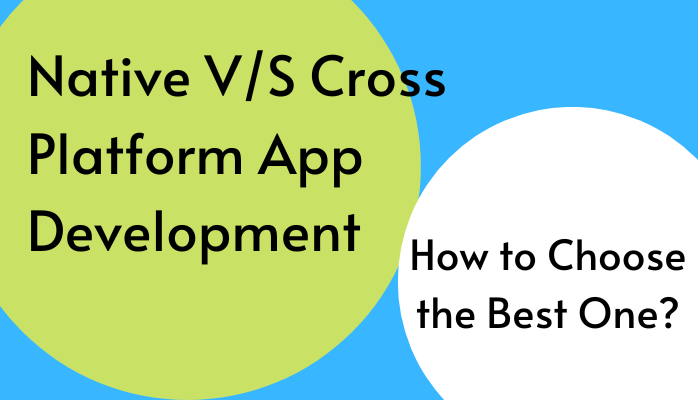Having an app is surely a great advantage for any business. It will give you access to reach customers all across the globe. But, is it that simple to deploy a team of app developers and make your app ready to launch at the app store? Not at all. In this article, we help you find the most appropriate app development platform that will simplify your task.
Today, there are countless applications on Google Play Store and Android App Store. But, most of the applications fail to give the desired results. It all depends upon which approach you to opt for designing your application. If you choose the most suitable solution, it can give excellent results.
Here, we are going to describe the two most popular app development approaches: Native and Cross-Platform.
Native Apps and Their Pros and Cons
Native apps are those which are designed specifically for a particular platform like Android or iOS. An app designed for Android OS will not work for iOS. Similarly, when you design a native app for iOS, it will not work for the Android platform.
Designing a native app will require a particular set of programming languages that are exclusively for that specific platform. Now, you might be thinking it is a very narrow approach. But this is not true. While developing a native application, you can use all the hardware and software components of the desired OS.
If your app requires the use of APIs or your mobile phone’s components like camera, microphone, Bluetooth, etc., the native app development approach is the best. Moreover, it offers exceptional UI/UX to users.
Merits of Using Native App Development
- They are sturdy, fast, and efficient as they are specifically designed for a particular OS.
- They allow you to use complete hardware and software components, like location, camera, microphone, etc. Moreover, you can also use the APIs.
- Incomparable UI and UX are possible only through a native app development approach.
- The app store will give priority to your application as it is developed for the related platform.
Demerits of Using Native App Development
- High cost is one of the major issues with this approach. You need to pay a decent development and maintenance cost.
- This approach is also time-consuming as you need to wait for months to launch your app.
- If you are planning to develop the same application for other platforms, you need to start from scratch. No part of the native application is reusable.
- To create an Android app, you have to deploy a team that works efficiently with Android Studio, Gradle, IntelliJ IDEA, etc. While for iOS applications, the native app development platforms are Objective C, XCode, Swift, etc.
Cross Platform Apps and Their Pros and Cons
Now, if you want to make an application for one platform but you can most part of the same code to develop the same application for another platform, this approach is called Cross Platform App Development.
Here, the biggest advantage is that you need not deploy another team for creating the same application for other platforms. As a result, the cost is comparatively lesser than the native app development. Flutter and React Native are the most popular tools for developing cross-platform apps.
There is another app development approach which is a mix of native and cross-platform. It is known as Hybrid app development. Some of the popular Hybrid apps are WhatsApp, Facebook, and Twitter.
Merits of Adopting Cross-Platform App Development
- It relieves you in app development costs as they are cheaper than Native application development.
- Another significant advantage of selecting this approach is that the application development time would be less.
- Not only app development costs, but also maintenance and update cost are also low.
- Most part of the programming code is reusable. Therefore, the same team of developers can design applications for other platforms.
Demerits of Adopting Cross-Platform App Development
- Unlike Native apps, you cannot access complete hardware and software components. Also, while developing the applications, you cannot use APIs.
- The UI/UX is not that good as compared with Native applications.
- It also compromises the speed and efficiency of the application.
How to Choose the Best One for You?
We have described the pros and cons of both Native and Cross-platform applications. But how can you identify which one is the best option for you? There is no direct answer to this question. It depends on multiple factors whether you should choose the Native or cross-platform app development.
Developing Cost: If your business is at the initial stage and you want to explore how launching an app will result, cross-platform app development will be the best option. It can make your app ready at a low price. While, the native app is suitable for businesses with a well-established consumer base.
Time: Developing a native application requires lots of time and effort. Therefore, it is best suited when you can wait for months to launch your app. On the other hand, the cross-platform application takes comparatively lesser time.
Business Goals: Another factor that helps you select the best option is your business goal. What do you want to offer to your users? What are they looking for? Does your application need access to hardware components? Asking this question will assist you in choosing the app development approach.
End User Experience: Giving an unforgettable user experience will surely be beneficial. But sometimes, it is not of much importance. So, if a great user experience is not required cross-platform approach is the most suitable option.
These are the most crucial factors that should be considered before deploying the app development. You can also take some additional factors into consideration as per your need.
Final Thoughts
Choosing the best approach for preparing your app will depend on the cost, time, business goals, end-user requirements, etc. After identifying these requirements, you can select whether to choose Native apps or Cross-platform applications.

